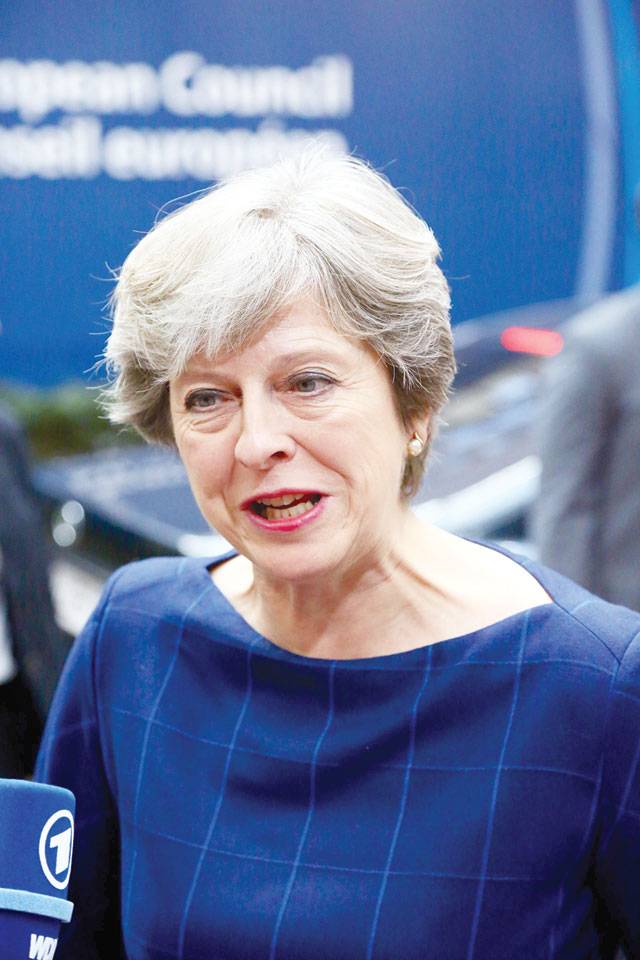BRUSSELS - British Prime Minister Theresa May urged EU leaders Thursday to urgently set out plans to move forward with Brexit negotiations, in particular on the rights of European nationals, as they prepared to delay key trade talks until at least December.
Arriving for the two-day summit, May accepted that her 27 European Union counterparts were unlikely to agree that there has been enough progress on divorce issues to move on to a second phase, saying the meeting was intended to “take stock”. But she urged them to start preparations to discuss trade and a transition deal at the next summit in December, telling reporters they would be “setting out ambitious plans for the weeks ahead”.
In a move to sway EU leaders on what is a key topic for them, May published an open letter to the three million EU citizens living in Britain on Thursday promising they would not be asked to leave after Brexit in March 2019.
She said a deal to secure their rights was “within touching distance” - but also told reporters that she wanted EU leaders to show “an urgency in reaching an agreement”.
EU President Donald Tusk warned he did “not expect any kind of breakthrough”, saying that while there had been “promising progress”, London needed to come up with more concrete proposals.
EU leaders are increasingly vocal about their frustration at divisions in May’s cabinet over Brexit, saying they are still unsure what Britain wants.
The talks had to be moved at the last minute from the EU’s new 321-million-euro Europa summit building after noxious chemicals in the catering area sickened several people on Wednesday
“Lessons from #EUCO kitchen: fuming over #Brexit must not become toxic,” Lithuanian Prime Minister Dalia Grybauskaite said on Twitter.
The EU agrees that of the three key separation issues at stake, citizens rights is the most advanced, but sticking points remain. Discussions on the bill Britain must pay to leave meanwhile are deadlocked and discussions on Northern Ireland still have far to go.
Over a working dinner with other EU leaders on Thursday evening, May will “encourage them to move the conversation on to consider the future partnership and the implementation period,” a senior official said.
She will then leave them to discuss Brexit without her on Friday morning.
After five rounds of Brexit negotiations produced few results, fears are growing that Britain may fail to strike a withdrawal agreement before its formal departure on March 29, 2019.
May engaged in a whirlwind of diplomacy ahead of the summit, calling the French and German leaders among others and having dinner with European Commission chief Jean-Claude Juncker in Brussels.
In an apparently symbolic move May walked into the summit room flanked by both Angela Merkel and Emmanuel Macron, with the three leaders deep in conversation.
Britain’s exit bill is the most poisonous issue. In a speech in Florence last month, May promised to maintain Britain’s contributions for two years after Brexit to complete the current EU budget period, totalling around 20 billion euros ($24 billion).
Germany and France insist that there should be no impact on the EU’s budget from Britain’s departure.
But European Parliament chief Antonio Tajani - whose institution will have a final veto on any Brexit deal - told the BBC that “20 billion is peanuts. The problem is 50 or 60 (billion euros).”
May is under pressure from senior Brexiteers at home, and a group urged her in a letter on Thursday to walk out of the talks if the EU does not agree to move on to trade.
Separately, Britain’s opposition party leader Jeremy Corbyn held talks with leading European Union negotiators on Thursday in what he said was a bid to “break the Brexit logjam”.
The Labour leader, whose unexpected success in a June snap election deprived May of her parliamentary majority, warned that leaving the EU without a deal would be “catastrophic”.
On Thursday Macron will push trade onto the agenda with a call to sceptical EU counterparts to put the brakes on free trade agreements or risk angering citizens who are increasingly wary of globalisation.
The leaders will also deal with foreign affairs including Turkey, the crisis over North Korea’s nuclear weapons and US President Donald Trump’s refusal to certify the 2015 Iran nuclear deal.
The crisis in Catalonia also forced its way into the debate, with Spanish Prime Minister Mariano Rajoy in Brussels shortly after his government said it would push ahead with suspending Catalan autonomy.
Arriving at the summit, Macron said EU leaders would send a “message of unity” with Madrid while Merkel added: “We hope there are solutions found on the basis of the Spanish constitution.”






